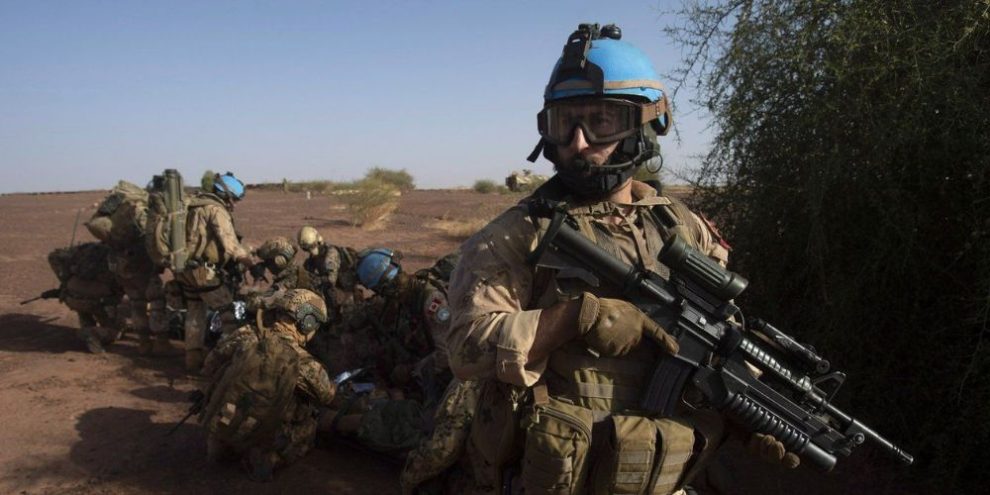
Canada only has two women from the military deployed on United Nations peacekeeping missions right now, raising concerns Ottawa is failing to lead by example and may be called out by the international body for missing its targets.
In 2017, former prime minister Justin Trudeau launched a big push to have Canada become a leader internationally promoting women in peacekeeping. It was part of the his government's feminist foreign policy.
But statistics show the number of female Canadian Armed Forces members contributing to peacekeeping has dwindled so much it recently hit rock bottom.
Barrie's News Delivered To Your Inbox
By submitting this form, you are consenting to receive marketing emails from: Central Ontario Broadcasting, 431 Huronia Rd, Barrie, Ontario, CA, https://www.cobroadcasting.com. You can revoke your consent to receive emails at any time by using the SafeUnsubscribe® link, found at the bottom of every email. Emails are serviced by Constant Contact
The most recent batch of UN statistics published at the end of May shows just 29 Canadians deployed as part of the 11 current UN peacekeeping missions.
That includes 18 military staff officers, six police officers and five experts.
The UN target says 22 per cent of the 18 Canadian Armed Forces officers deployed on those missions should be women. None of them are.
Three of the six police officers are women.
Walter Dorn, a professor of defence studies at the Royal Military College of Canada, said the poor numbers show Ottawa has retreated on the former political priority — and that this could hurt Canada's image on the world stage.
"We had a really hard time meeting the UN targets that we supported," Dorn said in an interview. "This is embarrassing in the international community and will cause the UN to flag Canada because we're not meeting the UN targets."
"I think the government is letting this slide," he added, saying the UN appears to be a very low political priority right now and that the poor showing could put coveted UN peacekeeping positions held by Canada at risk of being taken away.
The Canadian Press reached out to several offices for responses about the poor showing in these statistics, including the ministers for defence and foreign affairs, as well as their departments.
Only the Department of National Defence responded, which provided one response on behalf of all of them. It said the numbers fluctuate over time and that there are currently six women overall: four police officers in the Democratic Republic of Congo, and two Canadian Armed Forces members deployed on missions in the Middle East and South Sudan.
"Canada continues to champion the meaningful participation of women not only in UN peacekeeping, but also in other organizations such as NATO," said departmental spokesperson Kened Sadiku.
"UN Peacekeeping missions are only one type of peace operation and do not include important bilateral missions like work in Ukraine, the West Bank or at the International Criminal Court."
The department also said there are 22 women, police and civilians, deployed on "peace operations" missions, but the department did not provide any breakdowns or further information.
The Trudeau Liberals vowed across multiple elections that Canada would boost its UN contributions, and in 2017 promised to hike the number of women on peace missions. It also launched a fund called the Elsie Initiative to help increase the participation of women in UN peace operations, which research has shown increases the chances of mission success.
For some time, Ottawa was making strides. During the peacekeeping mission in Mali, between 2018 and 2023, the percentage of Canadian women in uniform on peacekeeping missions hit 25 per cent.
When Trudeau left office earlier this year, there was just one woman from the military on a UN mission.
Jane Boulden, a professor at the Royal Military College of Canada and Queen's University, said the dismal numbers can undermine Canada's image and may make it less believable when Ottawa puts forward such initiatives in the future.
But with Russia's invasion of Ukraine and Europe preparing for future conflicts and U.S. President Donald Trump showing hostility toward global institutions such as the UN, today's world is also a lot different from the early 1990s.
"Everybody understands the environment that all of us are in, in terms of Trump, the U.S. and the whole new world in that respect," Boulden said.
The Canadian Armed Forces currently has 1,900 members deployed in Latvia on a deterrence mission following Russia's invasion of Ukraine.
"Once the government made the decision to send troops to Latvia in support of NATO, then the whole idea of us providing any troops of any number to UN operations was gone. We just aren't capable of doing both in any number," Boulden said.
Women make up about 16 per cent of regular force members within the armed forces writ-large, and about 21 per cent of officers.
Peace operations in general are also in a "low ebb," Boulden said, with just 11 UN missions currently operating around the world.
"We are now perpetually at very low levels of UN contributions and then, in that context, that makes it even harder to have any significant number of women as part of that."
Canada has come to view itself as a leader from its past contributions UN peace keeping.
At the height of Canada's efforts in 1993, it was a top contributor to UN missions with 3,300 total military members deployed on UN missions.
But it has not been that way for a long time, now ranking 74th when it comes to personnel dispatched to missions.
Former Canadian peacekeepers say they are not surprised by the overall low statistics across both genders.
Retired Brig.-Gen. Gregory Mitchell said peacekeeping overall has taken a back seat since Canada’s involvement in Bosnia and Somalia in the 1990s and noted the military shifted gears in the 2000s toward counter-insurgency during the Afghanistan conflict.
“A lot of senior military people at the time believed that peacekeeping is not what we should be doing,” he said. “I don't know a lot about post-Afghanistan, but I think that attitude has probably carried on.”
This report by The Canadian Press was first published Aug. 24, 2025.





